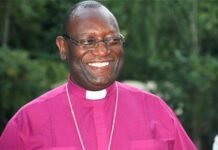Since 1991, when the Soviet Union collapsed and the Orthodox faithful and leaders in the former Soviet republics and formerly occupied Baltic countries began to press for independence from the Moscow Patriarchate, the Russian Orthodox Church and equally the Russian government have been worried about these efforts and worked hard to oppose them. This anxiety was further exacerbated in January 2019 when the Ecumenical Patriarch granted autocephaly to the Orthodox Church of Ukraine, which cost Moscow its largest presence abroad (Novayagazeta.ru, March 27). Indeed, the Moscow Patriarchate is clearly in retreat almost everywhere in the former Soviet space, a retreat that has increased in speed given the Kremlin’s all-out aggression in Ukraine (see EDM, August 12, 2021). Now, Moscow is in the process of losing control over yet another national Orthodox church—this time in the Republic of Latvia.
On September 5, Latvian President Egils Levits called for the Seimas (Latvia’s parliament) to give the Latvian Orthodox Church autocephaly and thus formalize its complete independence from Moscow. Three days later, the country’s parliament passed a law that requires the Latvian Orthodox Church to bring its statute into conformity with the new law by October 31 and thus become independent from Moscow (Eng.lsm.lv, September 5; Meduza, September 5). The parliament acted so quickly because, according to Levits, such a change was required for Latvia’s national security given the long history of Moscow using Orthodox churches abroad for political purposes (Orthodoxtimes.com, September 10).
Not surprisingly, the Moscow Patriarchate and Kremlin media have reacted with fury. Archpriest Nikolay Balashov, an adviser to Moscow Patriarch Kirill, said this was a most unhappy development because Latvia’s constitution proclaims the separation of church and state. Balashov also characterized the move as totally unnecessary because the Latvian Orthodox Church has been self-administrating since 1992. He said it was a return to the medieval principle of cujus regio, ejus religio, which held that the ruler of a country determines its religion. Moreover, he made clear that, since the state has no right to grant autocephaly, Moscow has no intention of recognizing Riga’s action and that no other Orthodox church should either (Interfax-religion.ru, September 8; Stoletie.ru, September 9).
Meanwhile, commentaries in pro-Kremlin media were even more emotional. One in Vzglyad, for example, labeled Latvia’s move as “completely fantastic and unprecedented in world practice” (Vzglyad, September 5). More independent Russian outlets were more cautious and apparently more accepting of something they consider inevitable in the current environment (Nezavisimaya gazeta, September 9).
The proximate cause of what Latvia has done lies in Ukraine, both in Russia’s war there and the Ukrainian Orthodox Church of the Moscow Patriarchate’s declaration of independence from Moscow because of the war and the earlier grant of autocephaly to the competing Orthodox Church of Ukraine. All this has echoed throughout Orthodox churches in the former Soviet republics and formerly occupied Baltic countries, which, in Soviet times, and in some earlier cases, were subordinate to Moscow. But Riga’s latest move is also the product of uniquely Latvian concerns about ending arrangements that its people and government see as surviving from the time of Soviet occupation, and they have good reason to believe Moscow has and will again use these arrangements to compromise Latvia’s independence.
L
Read it all in the Eurasia Daily Monitor Volume: 19 Issue: 133



